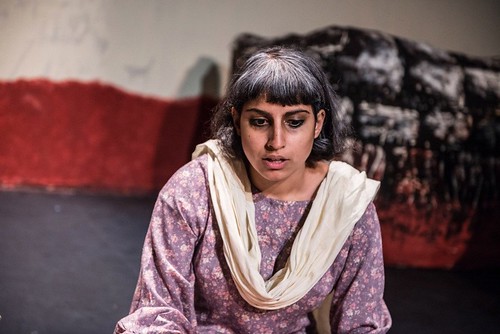Review – Khamosh Pani (Silent Waters)
✭✭✭✩✩ Slow burner
Bedlam Theatre Tue 22 – Sat 26 October 2013
Strong and intelligent, but sometimes frustrating, the EUTC’s world premiere adaptation of Sabiha Sumar’s 2003 film Khamosh Pani (Silent Waters) at the Bedlam theatre is a thought-provoking eye-opener.

Ayesha (Sita Sharma) Photo © Daniel Alexander Harris
Set in rural Pakistan in 1979, around the time of the execution of ex-prime minister Bhutto, the play concerns Ayesha, a widow, and her 18-year-old son, Saleem.
Ayesha, played with huge dignity by Sita Sharma, is quietly getting on with teaching the village girls the Quo’ran. Saleem, played with a strong sense of the impetuous by Ihsaan Kerr, is mostly concerned with his burgeoning love affair with Zubeida (Izzy Houriane).
Around the village square, the ongoing political situation is monitored with a deep cynicism by best pals: Mehboob the barber (Robbie Nicol) and Mubarak the tchai seller (Nihal Passanha). The pair provide both the comedy and a sense of proportion in the unfolding story.
Comedy and proportion are very much needed, with the arrival in the village of a pair of activists from a hard-core Islamist group. Notably the intolerant and puritanical Rasheed. Abhinav Jha gives him a sneering sense of arrogant self-importance as he attempts to enforce on the village the Islamic Law promoted by General Zia.
What really intrigues in the ensuing drama is its winding in together of seemingly disparate but connected issues. There’s the 32-year-old hangover from the bloody partition of Pakistan and India; the growing fundamentalism of young Pakistani men – off to fight in Afghanistan with the support of the US; and the question of where women stand in all this.
While Saleem becomes increasingly isolated from his family and drops his relationship with Zubeida in order to join forces with the fundamentalists, his mother is talking a much more tolerant understanding of Islam. Things come to a head with the arrival of a pair of Sikhs, on a pilgrimage to their place of birth.
Their arrival reignites Ayesha’s own nightmares from the time of Partition when Sikh and Muslim fought and killed each other. Women were routinely raped by the opposing side or killed by their own families to prevent them being defiled. A nightmare which will become reality if her own secret becomes known.
A strong eye for the domestic and seemingly banal
The production, directed by Satnaam Dusanj and Zulfiqar Ali Bhutto, has a strong eye for the domestic and seemingly banal. By placing enormously important issues in this setting it brings a rare clarity and understanding to them. Yet, as a film adaptation, it is not without its problems. Most notably in its storytelling.
The performances from a large and multiethnic cast are mostly excellent. There’s the odd stiffness of characterisation from some of the minor roles, but nothing which detracts too much. And the simple staging – with the surrounding theatre turned into a Pakistani outstation – is strong.
It is what the cast are asked to do – and the pace of it – which jars most. Long and intense moments of stillness and meaningful glances are just too cinematic in their formulation to work on the stage. Moments where cinema can pull focus from surroundings down to individuals, going from the general to the particular, add little on stage.
And where the film can use its surroundings and cinematography to give a sense of place to the action, there is little of that here. Coming to the play without prior knowledge of the film would diminish – to the point of obscurity – your understanding.
Too much is hinted at. What makes sense if you know the back story of Ayesha’s own escape from the suicide line at the village well, her rape, conversion to Islam and marriage to one of her rapists, just appears as a general sense of nightmarish foreboding without that knowledge.
There is much to be applauded in this bringing of an important film to the stage. But at present, Shinjini Basu’s adaptation and script feels only half way there – it has too much of a foot in it original format to work completely as theatre.
But what does work, works very well indeed.
Running time 2 hrs.
Bedlam Theatre, 11b Bristo Place, Edinburgh, EH1 1EZ
Tue 22 – Sat 26 October 2013. Daily 7.30pm.
Tickets and details on the Bedlam website: www.bedlamtheatre.co.uk
Click here to purchase the original movie
from Amazon:
ENDS



















